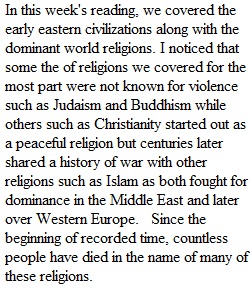


Q REFLECTIVE WRITING= worth up to 25 points. I want an overview of what you learned in class (if face to face class) or online as a result of the instructor’s master notes/ power points (online class). DO NOT REFLECT ON THE TEXT READINGS. It must be 150 words minimum- about 15 sentences. The reflection must contain one outside APA citation within the reflection from an online article- not the texts. It must also contain a reference of the article at the end (not just a web address). In other words- author or organization, magazine/ article title, date, etc. DO NOT USE QUOTATIONS- they just take up space! At least 85% of the reflection must be from my master notes or power points. View the example provide. Your response should also include all of the hallmarks of good writing: clear main ideas, specific details to provide evidence for your ideas, and writing that is clear of errors and typos. This reflection is due by 11:59 pm of Sunday, week 2. For grading expectations please view the rubric and, for good examples of this assignment, please look at the other attached documents. Assignment Example: REFLECTIVE WRITING EXAMPLE-1.docx Download REFLECTIVE WRITING EXAMPLE-1.docx Rubric HUM 360/361 Rubric for Weekly Reflections 25 pts HUM 360/361 Rubric for Weekly Reflections 25 pts Criteria Ratings Pts This criterion is linked to a Learning OutcomeRetelling of Experience/ Summary of Resource 5 pts EXCELLENT Detailed explanation and specific descriptors of experience or reading Writing is highly organized with a logical sequence 4.35 pts GOOD Clear explanation or objective observation of experience or reading Organization is clear and easy to follow 3.9 pts PROFICIENT Offered a mostly clear explanation of observation or experience Explanation offered with detail The organization is mostly easy to follow 3.45 pts DEVELOPING Vague explanation of experience or reading Non-objective observation of experience or reading No organization evident; confusing 0 pts INCOMPLETE Missing 5 pts This criterion is linked to a Learning OutcomeReflections/ Personal Response 5 pts EXCELLENT Reflects well on own work Provides many examples Examples are vivid and specific 4.35 pts GOOD Reflects on own work Provides some examples that are specific 3.9 pts PROFICIENT Some reflection on own work Provides few examples Examples are a mix of specific and generalized 3.45 pts DEVELOPING Mostly does not reflect on own work Offers minimal examples Examples are generalized 0 pts INCOMPLETE Missing 5 pts This criterion is linked to a Learning OutcomeRelevance to Classroom / Personal Experience 5 pts EXCELLENT Student relates observations to classroom concepts and/or personal experiences with detail and vividness 4.35 pts GOOD Student mostly connects observations to classroom concepts and/or personal experiences with details 3.9 pts PROFICIENT Student connects observations to some classroom concepts Student response is a mix of specific and generalized 3.45 pts DEVELOPING Student makes minimal reference to what is heard in class Student minimally connects classroom concepts to personal experience 0 pts INCOMPLETE Missing 5 pts This criterion is linked to a Learning OutcomeAnalysis of Experience 5 pts EXCELLENT Makes many inferences Comprehends deeper meanings High level of critical thinking expressed 4.35 pts GOOD Makes inferences most of the time Usually comprehends deeper meanings Critical thinking expressed at most points 3.9 pts PROFICIENT Some inferences are made Comprehends surface level meaning Critical thinking expressed at some points 3.45 pts DEVELOPING Few inferences are made Minimal reflection about the ideas Minimal evidence of critical thinking 0 pts INCOMPLETE Missing 5 pts This criterion is linked to a Learning OutcomeUsage/ Grammar/Mechanics MUGs) 5 pts EXCELLENT 1-2 MUGs errors 4.35 pts GOOD 3-4 MUGs errors 3.9 pts PROFICIENT 5-6 MUGs errors 3.45 pts DEVELOPING 7-8 MUGs errors 0 pts INCOMPLETE >8 MUGs errors 5 pts Total Points: 25
View Related Questions